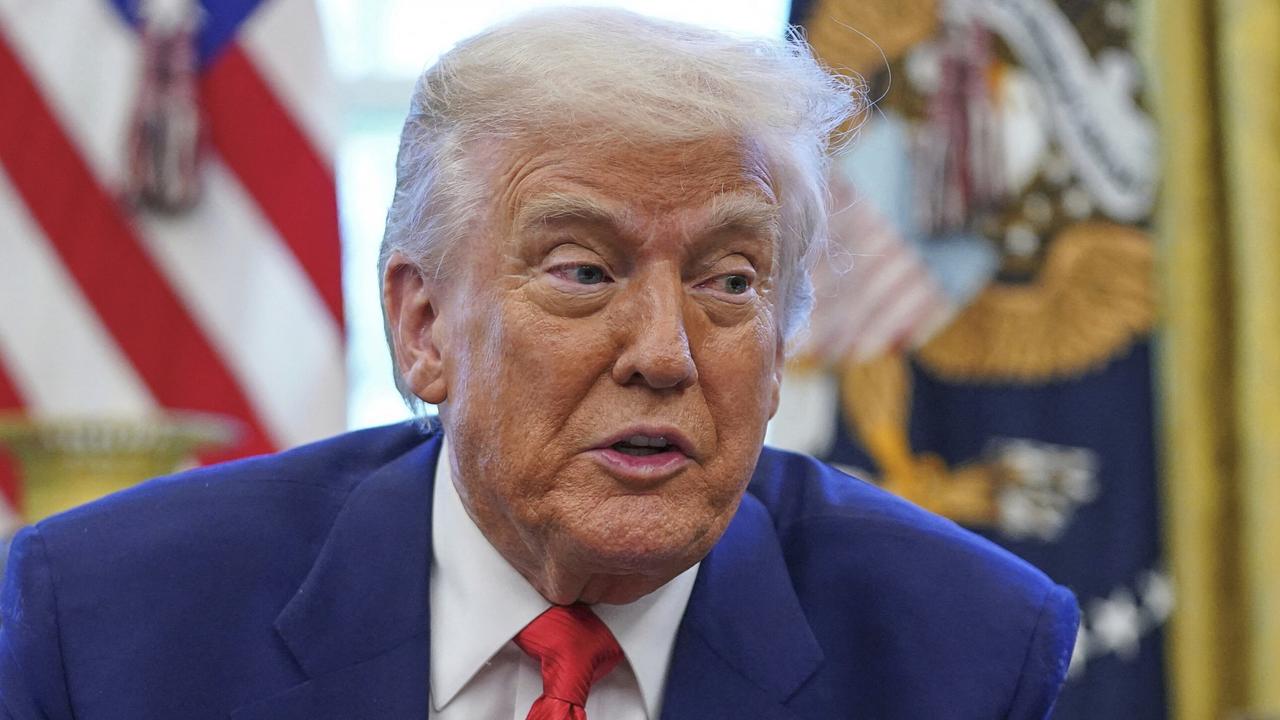Jerome Powell nominated as next Fed chairman
JEROME Powell has been tapped to become the world’s most powerful public servant, holding the global economy in his hands.
DONALD Trump has nominated Jerome Powell to be the next chairman of the US Federal Reserve when Janet Yellen’s term ends in February.
Mr Powell, 64, is seen as a safe pick whose selection will likely assure investors hoping for continuity at the central bank. Some analysts see Mr Powell, though, as more inclined than Ms Yellen to ease financial regulations and possibly to favour a faster pace of rate increases.
Mr Trump made the announcement in a Rose Garden ceremony with Mr Powell standing beside him. He said Mr Powell had earned the “respect and admiration of his colleagues” in his five years on the Fed’s board.
The president also praised Ms Yellen, the first woman to lead the Fed, whom he decided not to nominate for a second term. He called her a “wonderful woman who has done a terrific job”. In a departure from previous announcements of new Fed chairs, Ms Yellen was not in attendance Thursday.
Mr Powell himself said it had been a privilege to serve under Ms Yellen and her predecessor, Ben Bernanke, and said he’d do all he could to meet the Fed’s dual mandates of stable prices and maximum employment.
Sung Won Sohn, an economics professor at California State University-Channel Islands, suggested that the new chair would likely deviate little from Ms Yellen’s policy leadership if the economy performs as expected.
“Mr Powell could be considered a clone of Janet Yellen in a positive sense,” Prof. Sohn said. “He will continue the same cautious, gradualist policy in setting interest rates that she did.”
If confirmed by the Senate, Mr Powell would become chairman when Ms Yellen’s term ends February 3. Unlike the past three Fed leaders, Mr Powell lacks a Ph.D. in economics and spent years working at investment firms.
In choosing him, Mr Trump decided against offering another term to Ms Yellen despite widespread approval for her performance. The Yellen Fed and its go-slow approach to rate hikes have been credited with helping nurture the continued recovery from the Great Recession. Now, she will become the first Fed leader in decades not to be offered a second term after completing a first.
Conservative Republicans, who have complained that the Fed has grown too independently powerful, praised the selection. Senate Republican Leader Mitch McConnell pledged quick consideration of Powell’s nomination and said the nation needs “a more transparent and accountable Fed”.
Democrats expressed discontent that Ms Yellen hadn’t been given a second term. “Janet Yellen has been one of the most successful Fed chairs in history, and she deserved to be renominated,” said Senator Elizabeth Warren of Massachusetts.
Trump acknowledged in a recent TV interview that his decision on a Fed chair might have less to do with Ms Yellen’s performance than with wanting to impose his own stamp on the Fed.
Though Ms Yellen’s term as Fed chair ends February 3, her term on the board lasts until 2024. She hasn’t said whether she plans to remain on the board. Mr Powell has built a reputation as a collegial centrist on the Fed’s board.
Like the current and recent board members, Mr Powell never dissented from the Yellen Fed’s moves to embrace low rates and to adopt other unorthodox policies to help sustain the economy’s recovery from the 2008 financial crisis and the worst downturn since the Great Depression.
In a book about his years at the Fed, former Chairman Ben Bernanke praised Mr Powell “as a moderate and a consensus builder”.
His background makes Mr Powell something of an outlier in a Fed long defined by distinguished research economists like Ms Yellen, whose work has examined the relationship between inflation and wages, and Mr Bernanke, a scholar of the Great Depression.
But Aaron Klein, a fellow at the Brookings Institution who worked in the Obama administration’s Treasury Department, suggested that the absence of a scholarly background in economics should not impede Mr Powell’s ability to lead the central bank.
“I do not believe you need a Ph.D. in economics to chair the Fed,” Mr Klein said. “What’s needed is judgment, confidence and the ability to know when the models and data and the best minds of the Fed staff may have missed something.”
While Mr Powell is expected to generally stick with Ms Yellen’s blueprint, no one can be certain that he will. With US unemployment at a 16-year low and the economy on firm footing, Mr Powell might want to step up the pace of the Fed’s rate increases, which make loans costlier for companies and individuals over time.
For any Fed, the risk in doing so would be in potentially miscalculating the proper pace of rate increases and inadvertently triggering a recession. Corporate profits would suffer, and stock prices would likely tumble.
Nor can anyone know how well Mr Powell would manage an unforeseen economic crisis that might arise over the next four years — whether a recession, a credit crunch or a global financial crisis.
Mr Powell, known as Jay, has maintained a low profile on the Fed board — refraining, for example, from giving speeches on interest rate policy. Instead, he has chosen to focus more on the regulation of banks and on overseeing such obscure but vital Fed functions as the US payments system.
He supported rules the Fed adopted to implement the 2010 Dodd-Frank Act — which tightened regulations for financial firms after the 2008 crisis. But Mr Powell has expressed concern that some of the stricter restrictions might have gone too far, especially as they relate to smaller banks.
A graduate of Princeton University with a law degree from Georgetown, Mr Powell worked at the venerable Wall Street investment bank Dillon, Read & Co. before serving as a senior Treasury official under President George H.W. Bush. Later, he was a partner in the Carlyle Group, a giant in the private equity business, from 1997 through 2005.
Powell’s years in investment management have made him one of the wealthiest members of the Fed’s board. According to his latest financial disclosure form, his assets were valued at a range between $19.7 million and $54.9 million.
AMP Capital chief economist Dr Shane Oliver said the move signalled “more of the same”.
“Naturally, there may be a bit of market nervousness around the time of the handover and particularly around his first meeting in March next year, assuming he is approved by the Senate,” he wrote in a client note.
“But since becoming a Governor in 2012 Powell has been supportive of the Fed’s approach to monetary policy and is pragmatic and non-ideological and is likely to be a consensus builder as Chair.”
Dr Oliver said “barring any significant shocks” the new chair was unlikely to alter the Fed’s current path of gradually running down its balance sheet and raising interest rates three times next year.
“So given Trump liked Yellen why did he even make the change? First, he wanted to leave his mark,” Dr Oliver said. “Second, Powell appears supportive of taking a more relaxed approach to financial regulation than Yellen was.”



